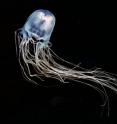Lethal stings from the Australian box jellyfish could be treated with zinc
Box jellyfish of the Chironex species are among the most venomous animals in the world, capable of killing humans with their sting. Their venom, though, which kills by rapidly punching holes in human red blood cells, can be slowed down by administering zinc, according to research published December 12 in the open access journal PLOS ONE by Angel Yanagihara from the University of Hawaii and colleagues. The researchers developed ways to extract venom from the jellyfish, and tested it on human blood and on mice. They found that the venom created pores in human red blood cells, making them leak large amounts of potassium, which causes cardiac arrest and death.
As Yanagihara elaborates, "For over 60 years researchers have sought to understand the horrifying speed and potency of the venom of the Australian box jellyfish, arguably the most venomous animal in the world. We have found that a previously disregarded hemolysin can cause an avalanche of reactions in cells. This includes an almost instantaneous, massive release of potassium that can cause acute cardiovascular collapse and death."
The authors treated the cells with a zinc compound which inhibits this process, and found that the treatment could slow the pore-forming process in cells, and increased survival times in the mice treated with the compound, zinc gluconate. The research suggests that the venom's capacity to increase potassium levels is what makes it so dangerous, and that rapid administration of zinc may be a potential life-saver in human sting victims.
Source: Public Library of Science
Other sources
- Zinc may help treat box jellyfish stingsfrom Sciencenews.orgThu, 13 Dec 2012, 19:20:08 UTC
- Deadliest Jellyfish's Sting May Have Met Its Matchfrom Live ScienceThu, 13 Dec 2012, 15:00:39 UTC
- Lethal stings from the Australian box jellyfish could be treated with zincfrom Science DailyThu, 13 Dec 2012, 4:30:34 UTC
